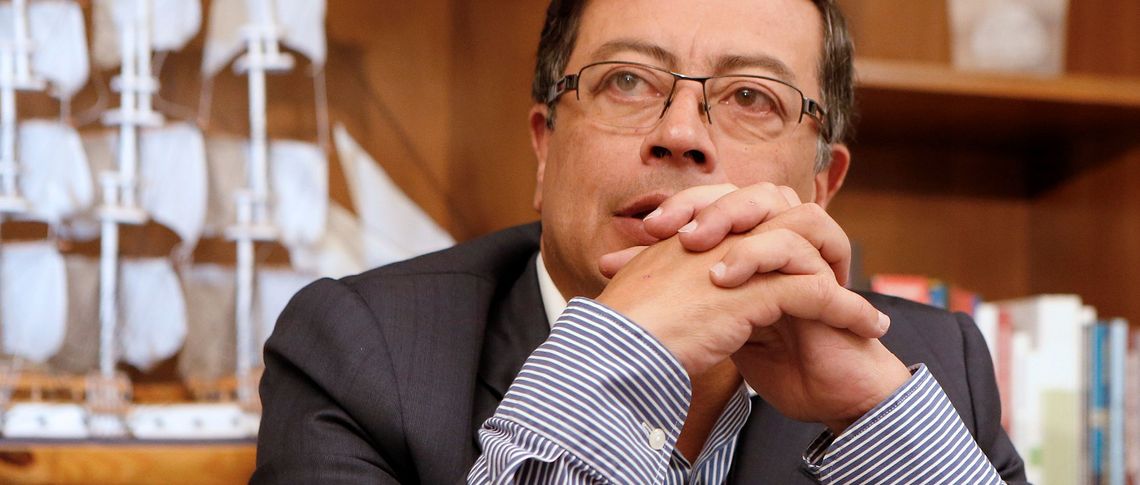A strange event occurred in Colombia last week. On the evening of 25 April 2023, Gustavo Petro, the country’s first leftist president and a former guerrilla, called on his 18 ministers to resign. The next day it was announced that only seven – the Ministers of Commerce, Industry and Tourism; Agriculture and Rural Development; the Interior; Health and Social Protection; Science, Technology and Innovation; Transportation and the presidential office administrator – would be replaced. The dismissals of popular Agriculture Minister Cecilia López and Finance Minister José Antonio Ocampo were deplored at home and abroad. Their departures fuel speculation that, in future, the new cabinet will agree more with Petro, who had often been viewed as making decisions alone.
The event put an end to several weeks of public disputes within the colourful governing coalition of Petro’s party, Pacto Histórico por Colombia (Historic Pact for Colombia), the Conservative and Liberal Parties, the Partido de la U (the Union Party for People) and the Colombian Communist Party, along with several other fringe parties. The move is not unusual in Colombia’s presidential system. It was included in the 1991 Constitution to break up political stalemates. Petro’s predecessors had also asked their cabinets to resign: the far-right Álvaro Uribe in 2010, Nobel Peace Prize laureate Juan Manuel Santos in 2013 and 2017, as well as the generally unpopular Iván Duque in 2019.
However, those cases cannot be compared with today. Petro’s decision to call on his cabinet to resign after being in office for less than nine months was new. No president had ever asked all his ministers to resign so soon after entering office. Most political observers and the fragmented opposition were caught completely off-guard. Several days later, the general public still seemed surprised and puzzled by the latest development in the ongoing political crisis and by Petro’s motives.
When change does not come fast enough
Was it only about the impending vote on a reform aiming to end private financial intermediaries and instead focus on primary and preventive healthcare for people living outside cities? The back and forth regarding the president’s major change promise had kept the country in suspense in recent weeks – and was one reason why the liberal education minister and two other cabinet members had resigned in February. Yet, representatives of the coalition of conservatives, liberals and the still influential centre-right Partido de la U had affirmed support for the complex legislation – angering their party leaders, who threatened sanctions and disciplinary proceedings.
While the established traditional parties formally supported the government agenda, they opposed principal aspects of Petro’s reform programme, and persistent tensions eventually prevented them from working in the ruling coalition. The situation became increasingly harder for Petro, especially as he was seeking to improve relations with neighbouring Venezuela and prepare the third round of negotiations with the last remaining rebel group, the National Liberation Army (ELN). He also still has to find the path to a comprehensive peace with a multitude of other criminal gangs and factions, in what he terms a Paz Total (‘Total Peace’).
A war of five decades cannot be resolved in just a few months.
Many regard Petro’s move as consistent, brave and decisive – especially the numerous forces and social groups championing his objectives and political project: they had brought about the historic victory of Petro and Francia Márquez. Now, their hopes are revived that Petro’s progressive plans for social justice, climate and environmental protection, agriculture and economics, feminist politics and a (new) drugs policy will be prioritised. The new ministers of the Pacto Histórico and its affiliated parties can do that. Although many of them understand that change must be gradual, they could not accept Petro’s post-election compromises and collaboration with Colombia’s traditional political establishment: that had been rejected during the election campaign.
There was a growing feeling among Petro’s supporters that the traditional parties’ approval of the reform proposals was only obtained by paying too high a political price. The compromise between the different political groups, which was initially perceived as positive, increasingly contributed to the president’s obstruction of key points of government. Additionally, there have been hardly any real improvements in security, state presence or social justice since Petro took office, while the meaning of his campaign slogan, Cambio por la vida (‘change for life’) remains vague. Furthermore, daily reports of kidnappings, expulsions and murders of social leaders and activists by armed groups remind Colombians that reaching a sustainable peace is not easy.
The four years wasted by Petro's predecessor, who rejected the peace deal, meant that Petro took office with major difficulties regarding the 2016 peace treaty concluded with the FARC (the Revolutionary Armed Forces of Colombia, the main Marxist-Leninist guerrilla group that had been fighting the government since 1964). A war of five decades cannot be resolved in just a few months. Nor can the problems of the economy, environment, labour market, education and pension sectors, and improvements that require structural and longer-term changes: these often progress at a snail’s pace, with many setbacks. At the moment, little more than hope remains for the many Colombians who continue to suffer from poverty, malnutrition and poor education and career opportunities.
Unfulfilled expectations
Despite assurances of socioecological reforms including decarbonisation and more renewable energies, environmental protection and nature conservation, aspirations and reality remain far apart. At the United Nations, Petro described the war on drugs as ‘failed’ but has not proposed proper alternatives. Thus, small farmers continue to plant coca, and glyphosate creates health risks for all forms of life. Participants all along the cocaine value chain are still criminalised and prosecuted.
These conditions have brought the historic awakening that gripped the country a year ago to a standstill. Many expectations remain unfulfilled, disappointment is growing. It is not that the political actors are slackening off or lack the political will to implement the government agenda. But their ambition to tackle all the stalled reforms raised high expectations amongst the population.
That said, the roundly defeated far-right opposition will not be proposing any alternatives – either in terms of personnel or content. The wealthy populist entrepreneur Rodolfo Hernández, Petro’s challenger in the second round of the presidential elections, has disappeared from public debate and once again faded into insignificance. However, Uribe, Petro’s predecessor, who vainly sought to get the Constitution changed so he could run for a third term, has emerged unscathed from numerous criminal trials and is again promoting his solutions. That said, a comeback to the national level, however, remains out of the question for him under current conditions – his name is too closely associated with the disastrous government of Duque and the falsos positivos, the 6.402 innocent people murdered by state institutions who were passed off as FARC fighters.
Once the right-wing opposition parties recover from the shock, they’ll try once more to torpedo Petro’s efforts to make Colombia more social.
With Petro’s newly reshuffled cabinet much more closely aligned with his agenda, he and Márquez have another chance. But important elections of mayors, provincial governors and members of parliament are scheduled for late October 2023, and should the entrenched traditional parties win those, Petro will have a much harder time ruling. However, if the parties linked to Petro himself receive strong mandates, his programme for the sociopolitical change that so many Colombians want could gain new momentum and pave the way for a progressive-left win in the 2026 parliamentary and presidential elections.
This is why Petro must get the parliament to approve his health reform now. The same is true for a new labour law to reduce informal employment and guarantee workers more rights, as well as the pension reform that is in its early stages. Without majority support in his own party, Petro is dependent on his negotiating skills and those of his loyalists.
Once the right-wing opposition parties recover from the shock, they’ll try once more to torpedo Petro’s efforts to make Colombia more social – with a more diversified economy that’s less dependent on oil exports, respects human rights and consolidates democracy. They will also continue their racist, misogynist attacks on Vice President Márquez.
Gustavo Petro has more than once positively surprised friends and critics – with $ 500 million from the US government to help Colombia combat the climate crisis due to human activity and € 26 million from the European Union for the Paz Total and the migration challenges. Without international support, it would be even harder for Petro and Márquez to help make Colombia more secure, peaceful and sustainable. The country’s partners would be wise to remain engaged. Value-based friendships are precious – especially in turbulent times.







